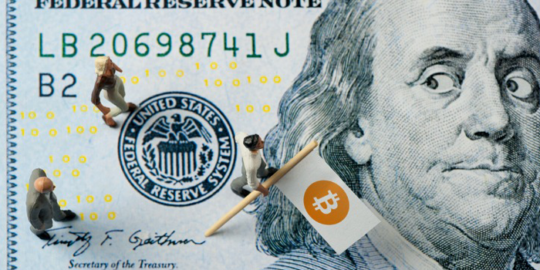Thanks to COVID-19, market unpredictability is at an all-time high…
In just the last two months, we’ve seen the market fall into bear territory… while also posting some of the largest one-day moves since 1985.
The entire global economy has turned upside down.
But even while stocks tank and the price of oil crashes, research is confirming something many crypto investors already knew…
“Bitcoin is here to stay.”
Those are the final words of a Grayscale’s 2019 investor study, in which the firm discovered some 21 million investors are interested in bitcoin.
While many folks remain skeptical of cryptocurrencies, many will soon come off the sidelines.
As we’ve reported, there’s been a new surge of interest in bitcoin during the COVID-19 quarantine.
That’s in part because some see bitcoin as an alternative to gold, or a “safe harbor” investment for volatile times… and with more time on their hands due to the COVID-19 lockdown, investors are learning everything they can about bitcoin and alternative investments.
If you’re new to bitcoin and Token Tracker, here are the basics…
Bitcoin is a pioneer
Bitcoin, the first viable form of virtual currency—or cryptocurrency—has been around for just over 10 years (2009).
A “bitcoin,” as most of you know, isn’t a physical coin. It’s a complex digital code that not only paved the way for new forms of payment, but for new, innovative investments.
That’s because it’s the first decentralized currency, and allows users to make secure, transparent transactions…
Bitcoin is possible because of a new technology called the blockchain.
In simple terms, you can think of a blockchain like a public digital ledger. It records bitcoin and other cryptocurrency transactions. The beauty of it is that it allows transactions between users to take place with a high degree of privacy (a user’s info is limited to a digital ID, called a security key) and independent of any government issuer (like a bank).
Note: Blockchains can be tailored to different needs. Some are private, and require permission to access, read, and write blockchain transactions or data, while public blockchains can be accessed and updated by anyone.
The bitcoin blockchain is a public chain, and contains every bitcoin transaction ever processed, enabling a user’s computer to verify the validity of each transaction. These transactions are verified using the security keys corresponding to the sender—think of them like your bitcoin user ID and PIN—and anyone with the means can help verify transactions through a process called “mining.”
This involves using specialized computer hardware, and earns the user a bitcoin reward for their work. (Mining is a complicated and expensive process—many bitcoin mining operations are in warehouses in remote locales, where the energy to power the transactions is cheap.)
How bitcoin is used
Bitcoin can be used as an investment and/or for daily monetary transactions.
- Buy and hold: Bitcoin investors can buy and hold it long-term through an investment account. However, virtual currency can be volatile. If you plan to use bitcoin as a long-term part of your overall investment strategy, building a position slowly in smaller quantities may be best.
- Currency: Though far from being widely accepted as cash, more and more merchants in the U.S. are beginning to accept bitcoin as payment for goods and services. AT&T, Subway, and even major sports teams like the Miami Dolphins and the Dallas Mavericks accept bitcoin as payment.
But unlike most other asset classes, the history of bitcoin transactions is transparent, thanks to the blockchain.
Think of it like ordering and tracking a package from Amazon…
When you buy a product from Amazon, you’re given a tracking number… a unique ID that records everywhere your package has been before it gets to you. If at any point your package stops, is damaged, or disappears, your unique ID allows you to verify and view every step of its travels.
You won’t know exactly who handled your package at each stop… and anyone with your tracking number can see where it’s been… but once a stop is recorded, that shipping history is permanent.
When buying or selling bitcoin, a user’s unique ID is similar to that Amazon tracking number… And the blockchain means every transaction associated with that ID can be traced, and all the way back to the very first purchase.
Today, industries like manufacturing and pharmaceuticals use blockchain for everything from inventory and materials tracking, to chain of custody for drugs and medical supplies.
Where and how to buy bitcoin
Many firms, like Robinhood, Ameritrade, Coinbase, and TradeStation, offer online platforms that let you purchase bitcoin. You can also purchase bitcoin directly from another person in a peer-to-peer (P2P) transaction through sites like Bisq. However, keep in mind if you elect a P2P platform, it increases the chance of fraud due to limited security.
If you own bitcoin already and want to pull it for cash, you can check coinatmradar.com for a list of bitcoin ATM locations throughout the U.S. and abroad. (Be aware of the fees, which range from 7–12%.)
If you’ve elected to use bitcoin as a money alternative, then you’ll need a way to secure your bitcoin security keys…
There are three primary ways:
- Hot wallets: Free of cost, hot wallets are apps or software that allow you to digitally store your bitcoin security key and info. All a person has to do is register the wallet to store virtual currency online, but the online nature of this option means it’s vulnerable to hackers and data breaches. Atomic Wallet and Exodus are two popular examples.
- Cold wallets: Though not as popular, cold wallet storage is more secure. A cold wallet is an offline, external device like a USB flash drive. This lowers your security risk—someone would have to steal your wallet to access it—but the average cost for these devices is around $100. The Ledger brand of wallets is one popular example.
- Paper wallets: You can keep and store your security key written in a physical format, like a notebook. The con of this is obvious—if you lose your notebook and can’t remember your key, neither you nor anyone else can recover your bitcoins.
Should you buy bitcoin now?
Like any investment, it is essential to consider your risk tolerance and objectives…
With market unpredictability at an all-time high—thanks to COVID-19—bitcoin has seen some wild moves lately… but even in the pre-COVID bull market, owning bitcoin was a bumpy ride.
For most investors, it’s best to consider bitcoin and other cryptos as an alternative investment to traditional holdings… a small, speculative position that won’t break your portfolio if prices crash.
But if you’re looking for an investment that’s not tied to governments, banks, or CEO performance, bitcoin is a great place to start.
Misty Fry is a former financial broker turned finance writer and SEO specialist. She’s passionate about helping readers understand retirement planning, asset protection, and how blockchain technology will change their financial futures. When she’s not writing, she’s reading, spending time with her husband, or attempting to wrangle one of their three young minions.
Editor’s note: This Thursday, April 30 at 8 p.m. ET, Frank will be hosting our first-ever webinar, Navigating the New World Order: A Curzio Research Townhall.
During this FREE event, he’ll cover everything from the COVID-19 risks the media and markets are missing… the sectors to avoid even when the crisis is finally over… and how you should invest NOW for the months and years ahead.
Plus, he’ll be answering questions from subscribers like you… The event is free to attend, but you must reserve your spot now.
Misty Fry is a former financial broker turned finance writer and SEO specialist. She’s passionate about helping readers understand retirement planning, asset protection, and how blockchain technology will change their financial futures. When she’s not writing, she’s reading, spending time with her husband, or attempting to wrangle one of their three young minions.











Thanks to COVID-19, market unpredictability is at an all-time high…
In just the last two months, we’ve seen the market fall into bear territory… while also posting some of the largest one-day moves since 1985.
The entire global economy has turned upside down.
But even while stocks tank and the price of oil crashes, research is confirming something many crypto investors already knew…
“Bitcoin is here to stay.”
Those are the final words of a Grayscale’s 2019 investor study, in which the firm discovered some 21 million investors are interested in bitcoin.
While many folks remain skeptical of cryptocurrencies, many will soon come off the sidelines.
As we’ve reported, there’s been a new surge of interest in bitcoin during the COVID-19 quarantine.
That’s in part because some see bitcoin as an alternative to gold, or a “safe harbor” investment for volatile times… and with more time on their hands due to the COVID-19 lockdown, investors are learning everything they can about bitcoin and alternative investments.
If you’re new to bitcoin and Token Tracker, here are the basics…
Bitcoin is a pioneer
Bitcoin, the first viable form of virtual currency—or cryptocurrency—has been around for just over 10 years (2009).
A “bitcoin,” as most of you know, isn’t a physical coin. It’s a complex digital code that not only paved the way for new forms of payment, but for new, innovative investments.
That’s because it’s the first decentralized currency, and allows users to make secure, transparent transactions…
Bitcoin is possible because of a new technology called the blockchain.
In simple terms, you can think of a blockchain like a public digital ledger. It records bitcoin and other cryptocurrency transactions. The beauty of it is that it allows transactions between users to take place with a high degree of privacy (a user’s info is limited to a digital ID, called a security key) and independent of any government issuer (like a bank).
Note: Blockchains can be tailored to different needs. Some are private, and require permission to access, read, and write blockchain transactions or data, while public blockchains can be accessed and updated by anyone.
The bitcoin blockchain is a public chain, and contains every bitcoin transaction ever processed, enabling a user’s computer to verify the validity of each transaction. These transactions are verified using the security keys corresponding to the sender—think of them like your bitcoin user ID and PIN—and anyone with the means can help verify transactions through a process called “mining.”
This involves using specialized computer hardware, and earns the user a bitcoin reward for their work. (Mining is a complicated and expensive process—many bitcoin mining operations are in warehouses in remote locales, where the energy to power the transactions is cheap.)
How bitcoin is used
Bitcoin can be used as an investment and/or for daily monetary transactions.
But unlike most other asset classes, the history of bitcoin transactions is transparent, thanks to the blockchain.
Think of it like ordering and tracking a package from Amazon…
When you buy a product from Amazon, you’re given a tracking number… a unique ID that records everywhere your package has been before it gets to you. If at any point your package stops, is damaged, or disappears, your unique ID allows you to verify and view every step of its travels.
You won’t know exactly who handled your package at each stop… and anyone with your tracking number can see where it’s been… but once a stop is recorded, that shipping history is permanent.
When buying or selling bitcoin, a user’s unique ID is similar to that Amazon tracking number… And the blockchain means every transaction associated with that ID can be traced, and all the way back to the very first purchase.
Today, industries like manufacturing and pharmaceuticals use blockchain for everything from inventory and materials tracking, to chain of custody for drugs and medical supplies.
Where and how to buy bitcoin
Many firms, like Robinhood, Ameritrade, Coinbase, and TradeStation, offer online platforms that let you purchase bitcoin. You can also purchase bitcoin directly from another person in a peer-to-peer (P2P) transaction through sites like Bisq. However, keep in mind if you elect a P2P platform, it increases the chance of fraud due to limited security.
If you own bitcoin already and want to pull it for cash, you can check coinatmradar.com for a list of bitcoin ATM locations throughout the U.S. and abroad. (Be aware of the fees, which range from 7–12%.)
If you’ve elected to use bitcoin as a money alternative, then you’ll need a way to secure your bitcoin security keys…
There are three primary ways:
Should you buy bitcoin now?
Like any investment, it is essential to consider your risk tolerance and objectives…
With market unpredictability at an all-time high—thanks to COVID-19—bitcoin has seen some wild moves lately… but even in the pre-COVID bull market, owning bitcoin was a bumpy ride.
For most investors, it’s best to consider bitcoin and other cryptos as an alternative investment to traditional holdings… a small, speculative position that won’t break your portfolio if prices crash.
But if you’re looking for an investment that’s not tied to governments, banks, or CEO performance, bitcoin is a great place to start.
Editor’s note: This Thursday, April 30 at 8 p.m. ET, Frank will be hosting our first-ever webinar, Navigating the New World Order: A Curzio Research Townhall.
During this FREE event, he’ll cover everything from the COVID-19 risks the media and markets are missing… the sectors to avoid even when the crisis is finally over… and how you should invest NOW for the months and years ahead.
Plus, he’ll be answering questions from subscribers like you… The event is free to attend, but you must reserve your spot now.